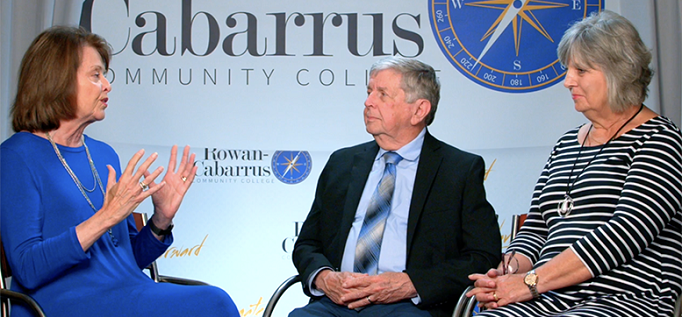A reflection on resiliency
By Sarah Devlin
August 16, 2023
On July 30, 2003, the news spread that Pillowtex had shuttered operations at textile plants in the U.S. and Canada, leaving nearly 4,000 residents of North Carolina’s Cabarrus and Rowan counties suddenly unemployed and well aware that the region would never be the same.
In the days that followed, as workers pondered their futures without the mill that was the hallmark of the city of Kannapolis and the surrounding region, few could see prosperity on the horizon. But a determined regional partnership that remains today was already looking forward, with Rowan-Cabarrus Community College, local government officials and workforce development agencies collaborating to provide help and hope to those who had lost their jobs.
Although the closure of Pillowtex marked the largest one-day job loss in North Carolina history, the regional response to retrain and re-employ displaced workers became a model for other towns to address mass layoffs.
“The college is, and for 60 years has been, ready and able to respond to workforce development needs in our community,” said Rowan-Cabarrus President Carol S. Spalding. “From helping displaced employees determine their next steps, to creating programs to train workers for the specific needs of companies new to our region, one of our top priorities is to meet people where they are and prepare them for successful employment.”
Support services and more
As Kannapolis formed around textile manufacturer Cannon Mills beginning in the early 1900s, many of the town’s residents joined the mill prior to completing a high school diploma or went straight to work at the mill after graduating high school. Others went off to college and returned home to work in supervisory or leadership positions.
People enjoyed a comfortable life in a thriving mill town, and even after several company sales – first to billionaire businessman David Murdock, then to Fieldcrest Mills, and finally to Pillowtex Corporation – no one wanted to consider a reality in which the mill would not exist as the town’s major employer. Even amid bankruptcy rumors and the looming possibility of layoffs in the months prior, the closure announcement stunned the entire region.
“People were in shock,” remembers Kannapolis Mayor Darrell Hinnant, who was new to the Kannapolis City Council at the time of the closure. “They had tears dripping off of their chins. Some were collapsing on the sidewalk. They had no clue what they were going to do.”
As community agencies set up sites to assist people with basic living needs, Rowan-Cabarrus Community College focused on helping displaced workers with employment services ranging from updating resumes and learning computer skills to going back to the classroom to earn their high school diplomas.
Rowan-Cabarrus team members worked at satellite offices in Kannapolis to serve thousands of people with varying needs, and the project became the catalyst for what is now the Rowan-Cabarrus R3 (Refocus, Retrain, Re-employ) Career Services Center, which still offers services tailored to the needs of job seekers. Today’s R3 team assists the public with job counseling, resumes, interviewing, career readiness certifications, computer fundamentals, and more.
“We meet people where they are, helping them build the skills they need and connecting them with employers,” Spalding said. “In the event that there is ever a company closing or a mass layoff, we are part of the response team, working closely with partners including the Centralina Workforce Development Board, NCWorks, local government officials and others. We hope it never happens, but if it does, we are here to give people the hope they need in a time of uncertainty.”
Looking back — and forward
As a reflection on the 20th anniversary of Pillowtex and to celebrate the award-winning progress that the Kannapolis area has experienced in the decades since, with major companies now in the area such as Amazon and Gordon Food Service, Spalding recently sat down for a recorded conversation with Hinnant and Jeanie Moore, who was then the college’s vice president of corporate and continuing education.
“I can’t believe it’s been 20 years,” Moore said. “We thought it would be a fleeting project, but it became a defining mission for us. People changed their perspective of the community college.”
Then, as today, Rowan-Cabarrus was able to deliver a variety of options for education and job transition, from short-term training for positions in healthcare, manufacturing and construction trades, to GED and English as a second language instruction. Programs such as welding technology and heating and refrigeration experienced large enrollment increases then and still enjoy popularity among students of all ages.
“As we honor our history, I am proud that Rowan-Cabarrus Community College’s involvement with the Pillowtex response made a positive impact on the health of both the community and the College,” Moore said. “It is gratifying to acknowledge our collective success and survival.”
There’s more to the story! Read the full article in CC Daily.



